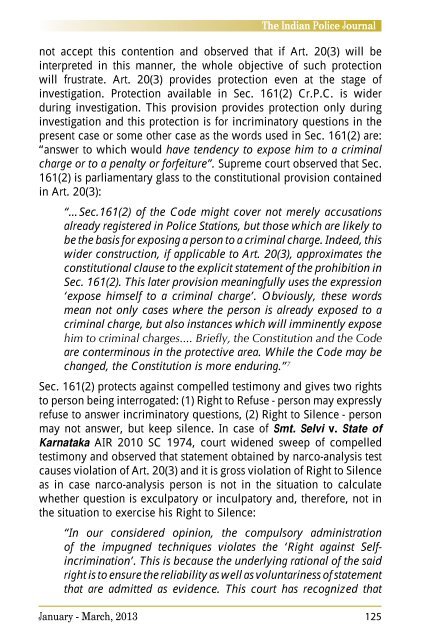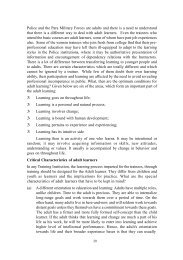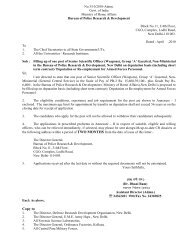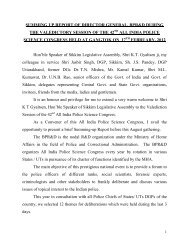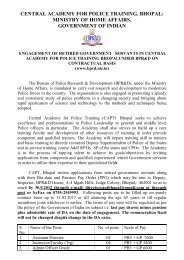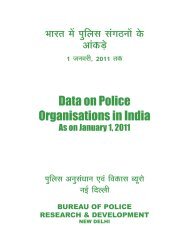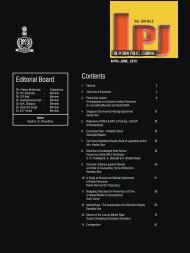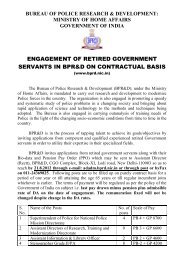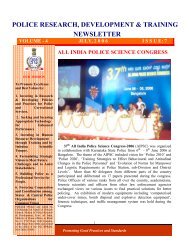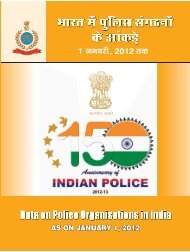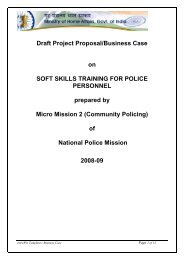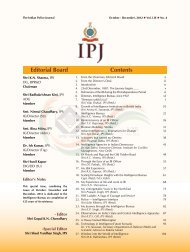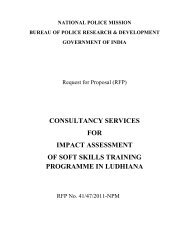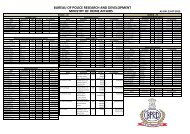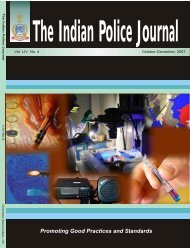by Police - Bureau of Police Research and Development
by Police - Bureau of Police Research and Development
by Police - Bureau of Police Research and Development
Create successful ePaper yourself
Turn your PDF publications into a flip-book with our unique Google optimized e-Paper software.
The Indian <strong>Police</strong> Journalnot accept this contention <strong>and</strong> observed that if Art. 20(3) will beinterpreted in this manner, the whole objective <strong>of</strong> such protectionwill frustrate. Art. 20(3) provides protection even at the stage <strong>of</strong>investigation. Protection available in Sec. 161(2) Cr.P.C. is widerduring investigation. This provision provides protection only duringinvestigation <strong>and</strong> this protection is for incriminatory questions in thepresent case or some other case as the words used in Sec. 161(2) are:“answer to which would have tendency to expose him to a criminalcharge or to a penalty or forfeiture”. Supreme court observed that Sec.161(2) is parliamentary glass to the constitutional provision containedin Art. 20(3):“…Sec.161(2) <strong>of</strong> the Code might cover not merely accusationsalready registered in <strong>Police</strong> Stations, but those which are likely tobe the basis for exposing a person to a criminal charge. Indeed, thiswider construction, if applicable to Art. 20(3), approximates theconstitutional clause to the explicit statement <strong>of</strong> the prohibition inSec. 161(2). This later provision meaningfully uses the expression‘expose himself to a criminal charge’. Obviously, these wordsmean not only cases where the person is already exposed to acriminal charge, but also instances which will imminently exposeare conterminous in the protective area. While the Code may bechanged, the Constitution is more enduring.” Sec. 161(2) protects against compelled testimony <strong>and</strong> gives two rightsto person being interrogated: (1) Right to Refuse - person may expresslyrefuse to answer incriminatory questions, (2) Right to Silence - personmay not answer, but keep silence. In case <strong>of</strong> Smt. Selvi v. State <strong>of</strong>Karnataka AIR 2010 SC 1974, court widened sweep <strong>of</strong> compelledtestimony <strong>and</strong> observed that statement obtained <strong>by</strong> narco-analysis testcauses violation <strong>of</strong> Art. 20(3) <strong>and</strong> it is gross violation <strong>of</strong> Right to Silenceas in case narco-analysis person is not in the situation to calculatewhether question is exculpatory or inculpatory <strong>and</strong>, therefore, not inthe situation to exercise his Right to Silence:“In our considered opinion, the compulsory administration<strong>of</strong> the impugned techniques violates the ‘Right against Selfincrimination’.This is because the underlying rational <strong>of</strong> the saidright is to ensure the reliability as well as voluntariness <strong>of</strong> statementthat are admitted as evidence. This court has recognized thatJanuary - March, 2013125


